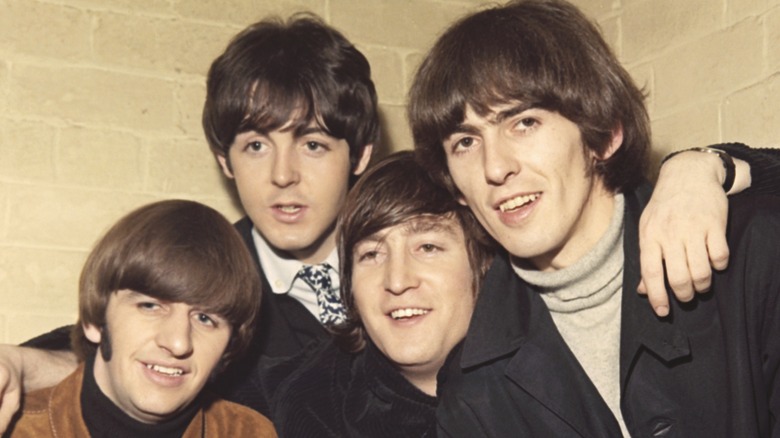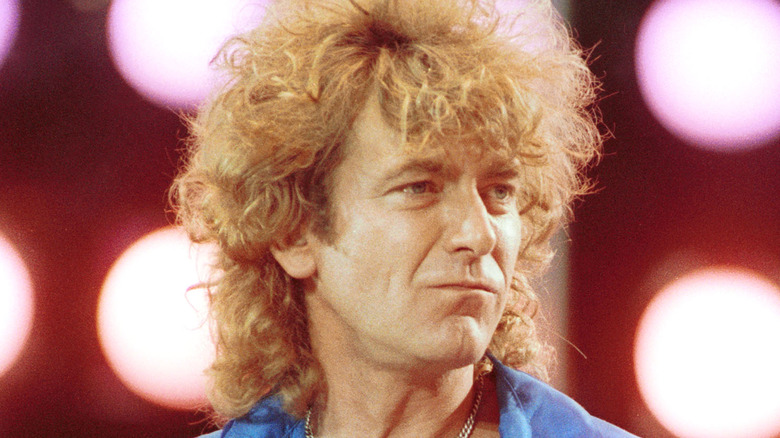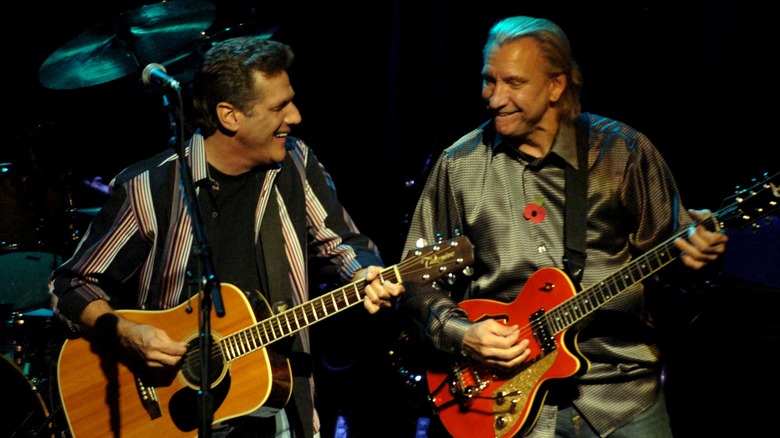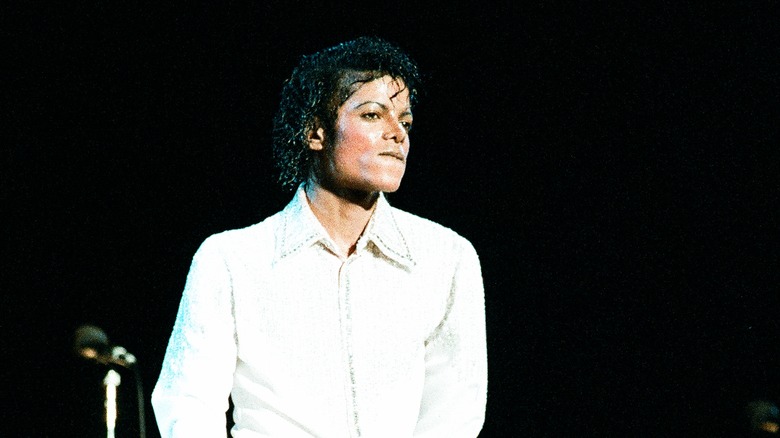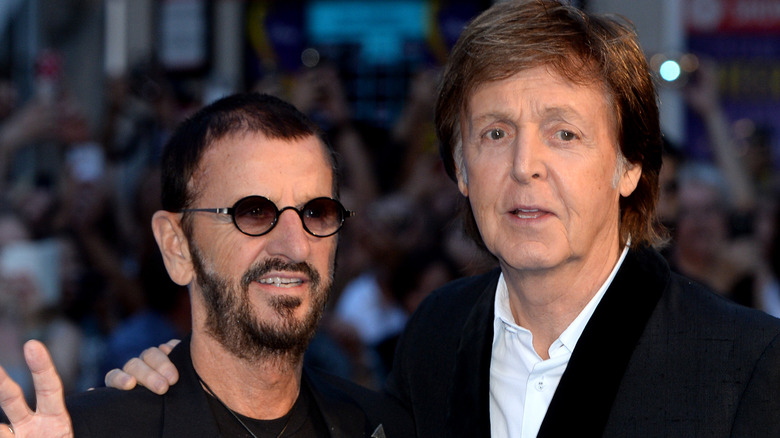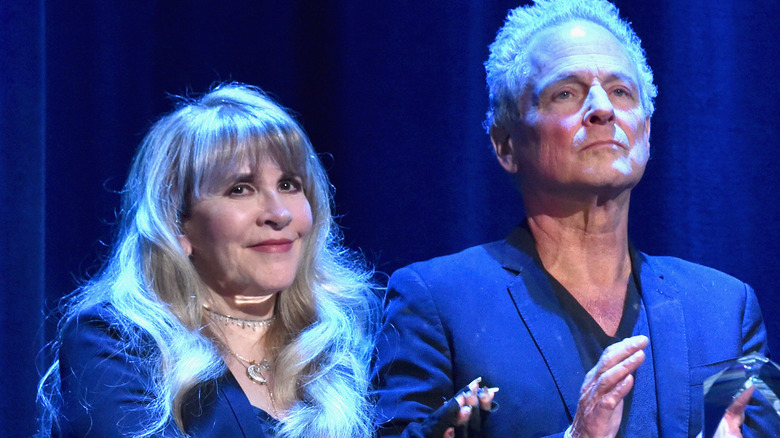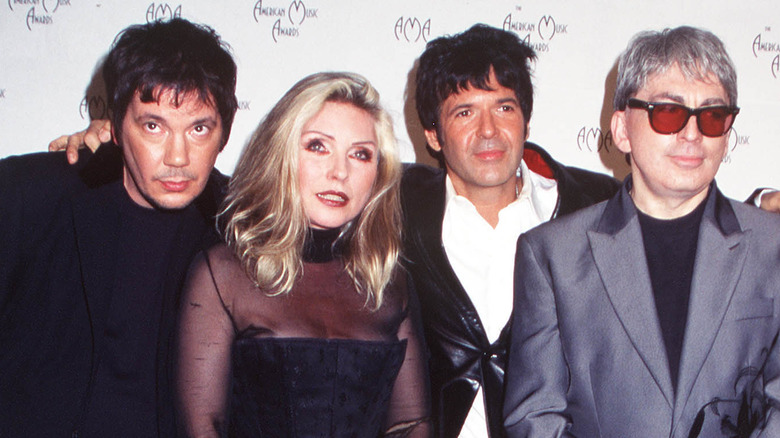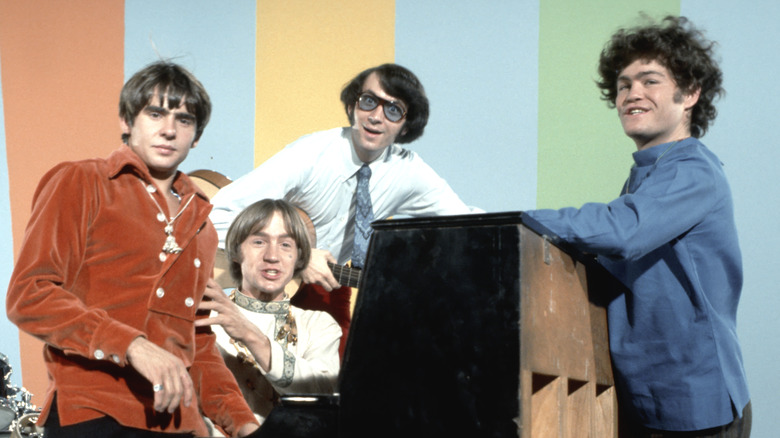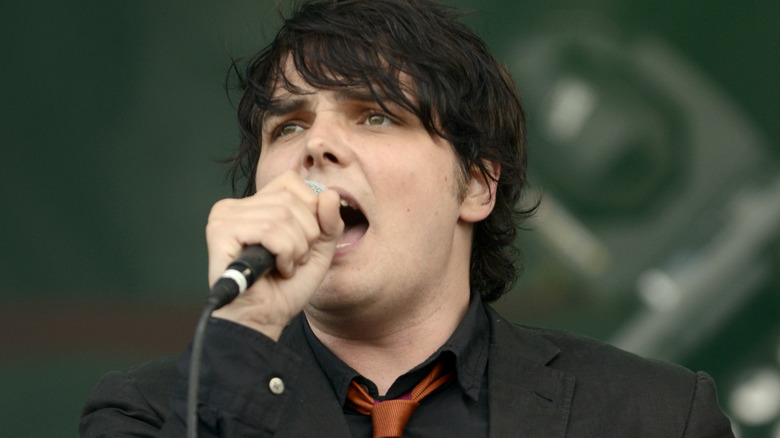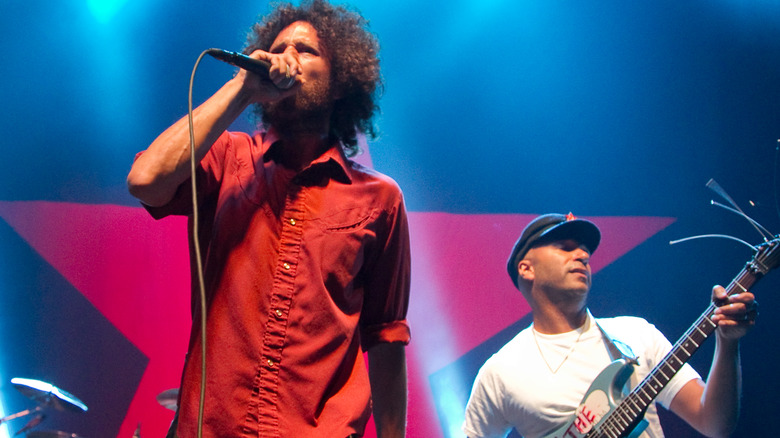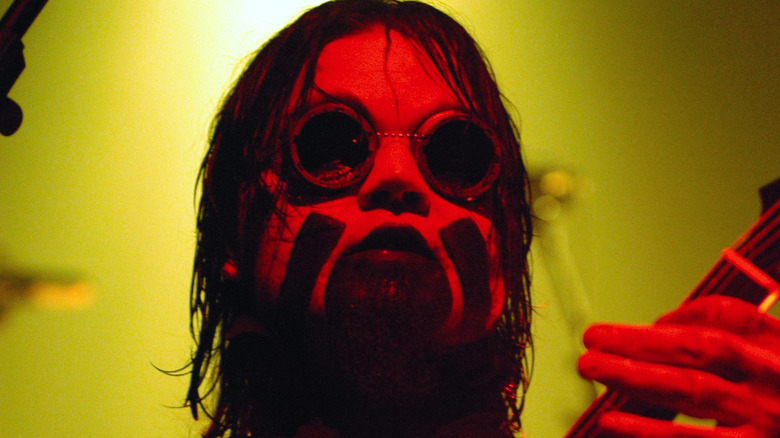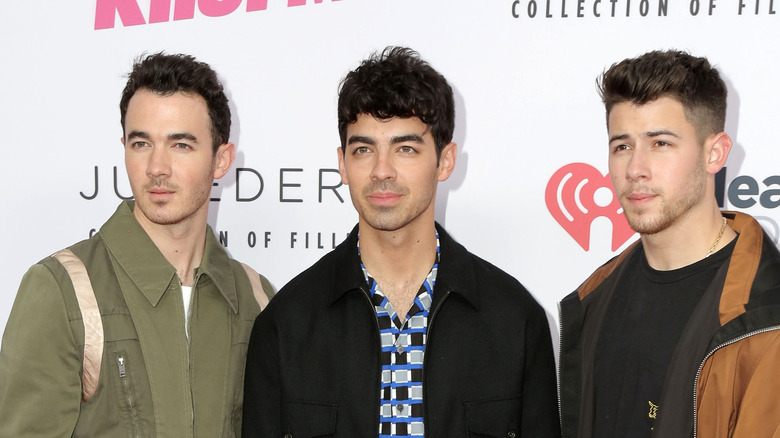The Real Reason These Bands Reunited After A Big Break Up
It's got to be a strange and confusing feeling to break up or walk away from a hugely successful and popular rock band. The idea that one day it will get to be too much, creatively unfulfilling, or a hostile situation involving intolerable, obnoxious, and musically terrible probably doesn't occur to anybody when they first strap on a guitar or a bass, or set up a drum kit, and start jamming in a garage with their friends. But it seems to be almost an inevitability: Rock bands form, and rock bands split up. It's the circle of rock n' roll life.
Bands split up for a variety of reasons, most if not all of them justifiable, but even the most acrimonious splits are no match for certain other forces that fuel entertainment: nostalgia, passionate fan interest, money, and a deep connection with old pals and colleagues among them. Here are some of the biggest bands in music history who broke up and then surprisingly reunited years later.
Led Zeppelin
After dominating the 1970s with multi-platinum albums and classic rock staples like "Stairway to Heaven," "Kashmir," and "Black Dog," Led Zeppelin broke up in 1980, according to the Associated Press, following the death of drummer John Bonham. The surviving members — Robert Plant, Jimmy Page, and John Paul Jones — would reunite less than five years later, performing on the Philadelphia stage at Live Aid in 1985, staged to raise money for African famine relief, according to Far Out.
To fill in for Bonham, Zeppelin recruited Chic's Tony Thompson and Genesis's Phil Collins. Nevertheless, the show was a mess. Neither Thompson nor Collins had been given much rehearsal time, while Plant had rehearsed so thoroughly that he'd lost his voice (according to Rolling Stone, via Blabbermouth). Meanwhile, Jimmy Page didn't get a chance to warm up and played the gig on an out-of-tune guitar. In 2004, Led Zeppelin refused to allow their "sub-standard" performance to be included on a Live Aid DVD (per the BBC).
Nevertheless, and after two of its members recorded and toured together in the '90s as Page and Plant, Led Zeppelin, with Bonham's son, Jason Bonham, behind the kit, reunited once more. In 2007, the mostly reformed Led Zeppelin played London's O2 Arena, part of a large bill of acts to pay tribute to Ahmet Ertegun, the deceased head of the band's label, Atlantic Records. The show raised money for Ertegun's educational foundation.
The Eagles
A great number of Eagles songs are about chilling out, but life in the fast lane meant the band didn't enjoy a "Peaceful Easy Feeling" with one another. Tensions in the band were so severe that by the time the group split in 1980, Glenn Frey and Don Felder had threatened to beat up one another during a concert (per Far Out). When Don Henley was asked when he'd get back with his fellow Eagles, his usual reply (per Ultimate Classic Rock): "When hell freezes over." In other words, never.
According to Ultimate Classic Rock, former Eagles manager Irving Azoff assembled an Eagles tribute album for his label, Giant Records, in 1993. With an aggressive nod toward the band's influence over modern country music, he recruited major artists in that genre to cover well-known Eagles songs for "Common Thread," including Travis Tritt, who took on "Take it Easy." That became the leadoff single, necessitating a music video. "The only way I'm going to do a video is if we get the Eagles back together," Tritt recalled in "Country Music: The Encyclopedia." Amazingly, five former Eagles showed up for the shoot and spent the day hanging out and shooting pool on camera. They didn't actually play any music that day, but they had such a good time that the Eagles kept the reunion going. They recorded a live concert special for MTV with an accompanying album titled, amusingly, "Hell Freezes Over."
The Jacksons
The Jackson 5's catchy, bubblegum pop-meets-Motown proved irresistible to record buyers, and within a year, they'd scored four #1 hits — "I Want You Back," "ABC," "The Love You Save," and "I'll Be There." The undisputed breakout star of the Jackson 5: a young Michael Jackson, who sang, danced, and commanded the stage like a seasoned professional. In 1976, the Jackson 5 departed Motown for Epic Records and brought in Randy Jackson to replace the exiting Jermaine Jackson, who went on to have a successful solo career throughout the '70s and '80s with hits like "Daddy's Home" and "Let's Get Serious."
But Michael Jackson's solo work almost completely overshadowed Jermaine's efforts. In 1979, Michael Jackson's "Off the Wall" was released and went platinum nine times over and spawned the #1 hits "Rock With You" and "Don't Stop 'Til You Get Enough." As big as that was, his follow-up, "Thriller" was even bigger. It won the Album of the Year Grammy, would herald the peak of the music video age, and sell a world record 66 million copies.
By 1984, Michael Jackson, the "King of Pop," was the most famous and celebrated entertainer on Earth, and his family (and Epic Records) cashed in by getting the old band back together. In 1984, the Jacksons recorded its first album in four years, "Victory," featuring all six brothers, including Michael and the departed Jermaine. According to the Los Angeles Times, the tour in support of "Victory" was plagued with financial and technical problems.
The Beatles
Officially the best-selling rock band ever, the Beatles burst out of Liverpool and captivated the world between 1962 and 1970, topping the American pop chart a record 20 times, per Newsweek. Creative tensions among the Fab Four — John Lennon, Paul McCartney, George Harrison, and Ringo Starr — led to the Beatles' split in 1970. All four would enjoy solo careers of varying levels of success, but the world clamored for a reunion. It would never come to pass, following the December 1980 assassination of John Lennon at the age of 40 outside of his apartment in New York City.
The Beatles reunited briefly, and imperfectly, in the mid-'90s. In 1995, the U.K.'s ITV and the U.S.'s ABC aired "The Beatles Anthology," a multi-part, multi-night documentary purporting to tell the complete history of the band. Three double-disc companion albums hit shelves in 1995 and 1996, and two of them included what was previously thought impossible: new songs featuring all four Beatles. According to The Independent, early in the project's development, Yoko Ono gave McCartney demos her late husband recorded some 15 years earlier. He liked "Free as a Bird" and "Real Love," and convinced Harrison and Starr to record new vocal and instrumental parts to flesh out the skeletal, muffled songs that Lennon left behind.
The new songs helped propel sales of the "Anthology" compilations and were reasonable pop hits, too — "Free as a Bird" hit #6 on the Hot 100, and "Real Love" stalled at #11.
Fleetwood Mac
Fleetwood Mac's history is marked by several distinct eras. Starting off as a hard-charging blues-rock band in the 1960s, they adopted a California-style soft rock sound in the mid-1970s with the addition of singer-songwriters Lindsay Buckingham and Stevie Nicks. The second Mac album with those two on board, 1977's "Rumors," would become one of the best-selling albums ever, moving 20 million units. That formation of the group stayed intact part-time in the '80s while members pursued solo success, with Buckingham leaving the band entirely in 1987 and Nicks and Christine McVie bowing out of touring duties. Fleetwood Mac was all but over by 1991, the year the band released a career-capping box set and lost replacement guitarist Rick Vito.
That classic Mac lineup — Buckingham, Nicks, McVie, and founding members John McVie and Mick Fleetwood — reconvened for the first time in more than a half-decade at the behest of a president. According to Far Out, Bill Clinton campaigned across the United States in 1992, using Fleetwood Mac's 1977 inspiring singalong "Don't Stop" as this theme song at rallies and events. Clinton won the presidential election, and when planning his inauguration festivities for January 1993, he had his people reach out to the core five of Fleetwood Mac to see if they'd reunite to play "Don't Stop" at the Inaugural Gala. Most of the band approached it as a special one-off, but then got back together once more in 1997 for "The Dance," an MTV concert special and companion record.
Blondie
By the early 1980s, charismatic, telegenic frontwoman Deborah Harry was so famous that the band launched a marketing campaign to proclaim that "Blondie is a group" (per the New York Times) and not just a singer and some anonymous backing musicians. Blondie was a group, one of the most versatile ever. Coming out of New York's underground scene, Blondie scored hits with rap ("Rapture"), reggae ("The Tide is High"), disco ("Heart of Glass"), punk ("One Way or Another"), dance ("Atomic"), and New Wave ("Dreaming") tunes. After helping set the tone and course of pop and rock in the 1980s, Blondie disbanded in 1982 (per the New York Post), following a lackluster reception to their sixth album "The Hunter." That was one problem too many in a band also experiencing creative tensions, money issues, and guitarist Chris Stein's diagnosis of pemphigus, a rare and serious genetic disease, according to the Orlando Sentinel.
After 17 years apart professionally (and 10 personally; Harry and Stein divorced in 1989), Blondie reunited in 1999. The reason: money, but also out of a sense that it's what the world wanted. "There was an interest in the band that never really waned," drummer Clem Burke said. "You'd keep hearing our songs in movies and on the radio." Blondie embarked on a world tour and released a new album called "No Exit," named after the hell-set play by Jean-Paul Sartre, because "we felt there was no exit from Blondie," Burke quipped.
The Monkees
The Monkees, per AllMusic, weren't originally a real band — they were assembled, picked more for their acting abilities to play a rock band on a sitcom also called "The Monkees." The band lobbied to play its own instruments and songs of their own creation, but those proved unpopular, and the foursome split up shortly after Peter Tork left in 1969.
In 1975, according to Monkees Live Almanac, all four members — Michael Nesmith, Davy Jones, Micky Dolenz, and Tork — discussed a reunion, suggested by a Hollywood talent agency. Tork and Nesmith passed, so Dolenz and Jones teamed up with the songwriters behind many Monkees hits, Tommy Boyce and Bobby Hart, and toured as The Great Golden Hits of the Monkees. About a decade later, nostalgia package tour promoter David Fishof approached Tork about a 20th anniversary Monkees reunion tour. This time, he was in, and eventually Jones, Dolenz, and Nesmith signed up, although the latter thought the tour would consist of a handful of concerts (via Goldmine, per Monkees Live Almanac), which he felt wouldn't conflict with his TV production duties. "It went from 20 dates to 200 in a matter of weeks," Nesmith explained as to why he eventually backed out.
What blew up the Monkees: In early 1986, MTV aired a weekend marathon of every episode of "The Monkees." "We've never received such a volume of mail," MTV executive Tom Freston told Rolling Stone. Almost every date on the tour sold out, necessitating the expansion.
My Chemical Romance
A definitive band of the early 2000s, My Chemical Romance combined goth, emo, and alternative sounds to create dark, theatrical, anthemic rock. Founded by brothers Mikey and Gerard Way, the group recorded half a dozen albums, and scored huge hits with huge songs like "Welcome to the Black Parade," "Famous Last Words," and "I'm Not Okay (I Promise)." But by 2013, it was all over. "Like all great things, it has come time for it to end. Thanks for all of your support, and for being part of the adventure," the band collectively said in a breakup announcement on its website.
Six years was enough of a break, however, and My Chemical Romance played a reunion show in December 2019 at Shrine Auditorium in Los Angeles, according to NME. Gerard Way found it to be a therapeutic and extremely enjoyable experience, and that had a lot to do with his approach. "That was definitely the most fun I've ever had playing on stage with My Chemical Romance, for sure," Way told YouTuber Aiden Gallagher. "Something that I tried to do, and this was conscious, was relinquish some control. I think about control a lot, and in the years since the band broke up I've really examined control in all of its forms." With the pandemic interrupting any reunion momentum, the reconstituted My Chemical Romance planned to play around Europe and the U.S. in 2022, per Brooklyn Vegan.
Rage Against the Machine
After years of angrily speaking truth to power and calling out injustice through its rap-rock tunes like "Freedom," "Bulls on Parade," and "Guerrilla Radio," Rage Against the Machine split up following the release of "Renegades" in 2000, a collection of covers. Frontman Zack de la Rocha had told the rest of the band that he planned on a 2-year break, but instead released a statement without their foreknowledge announcing that the split was more of a permanent nature, according to Far Out. The reason, according to de la Rocha: creative differences. "It's not unique among rock bands to find the occasional dissension," de la Rocha said. Remaining Ragers Tom Morello, Tim Commerford, and Brad Wilk formed the mostly apolitical radio-friendly rock band Audioslave, with Soundgarden's Chris Cornell replacing de la Rocha on the microphone.
De La Rocha's hiatus was temporary after all. In 2008, per the Los Angeles Times, Rage reunited to play an anti-Iraq War protest show outside the Democratic National Convention. Two weeks later, according to the Star Tribune, the reformed Rage Against the Machine played a show near the Republican National Convention, taking the stage in black hoods and prisoner jumpsuits like the ones worn by inmates at the Guantanamo Bay prison facility.
A 2020 Rage Against the Machine tour was delayed to 2022 and 2023 because of COVID-19 restrictions, per Rolling Stone.
Mudvayne
Emotionally-driven, intensely felt and performed, sludgy, heavy rock music was the guitar-driven radio-friendly style of the moment in the 2000s. Among those bands, Mudvayne proved particularly popular, releasing seven albums in the first decade of the 2000s and notching big, hard hits like "Fall Into Sleep," "Do What You Do," and "Happy?". Mudvayne was as much of a performance art collective as it was a band, incorporating aggressive and provocative masks and costumes into its stage show, making the band something of a postmodern KISS or more mainstream-friendly Slipknot. According to NME, Mudvayne announced a hiatus after its self-titled 2009 record, and continued staying apart, with both singer Chad Gray and guitarist Greg Tribbett doing time in the band Hellyeah, among other side projects.
The Mudvayne fans wanted the band back together, voiced their desire, and the musicians listened. "In our fan surveys, Mudvayne has consistently been one of the most requested bands — even though they weren't an active band!" rock festival promoter Danny Wimmer told Revolver in 2021. And so, after persistently persuading the members of Mudvayne to reunite, the band agreed to a meeting with Wimmer and then signed up to play four huge outdoor metal fests in the fall of 2021.
The Jonas Brothers
The Jonas Brothers could have gone down as a bubblegum pop act, three teen idol siblings who burst on the scene and disappeared when the next thing came along. According to AllMusic, the Jonas Brothers signed their first deal with Disney's Hollywood Records in 2007, churned out a couple of albums, a concert film, the sitcom "JONAS," and the TV movie "Camp Rock" all over the course of two years. Largely inactive for a while, Nick, Joe, and Kevin Jonas officially disbanded the band in 2013.
The Jonas Brothers reconvened in 2019. During a concert at Los Angeles' Grammy Museum, Nick Jonas credited the revival to "a group of college-aged guys who probably at the time the song first came out were young enough to love it without any inhibitions or insecurities about loving the song," Jonas said (via EW). The tweets professed a desire to see the Jonas Brothers play "Year 3000" live. "I started to think about that quite a bit that maybe there's a whole new group of fans who actually were embarrassed to like the Brothers at a certain point in their life and now can actually just enjoy it because as it happens for all of us, the things we were embarrassed about when we were younger become the things we love about ourselves when we're older." Nick asked Kevin about a reunion, and he was in right away, while Joe took some more convincing.
